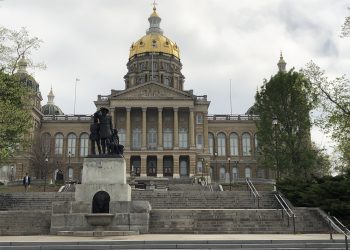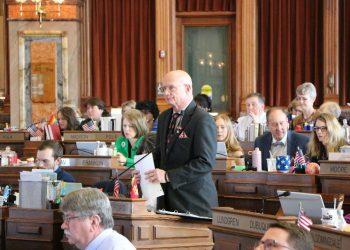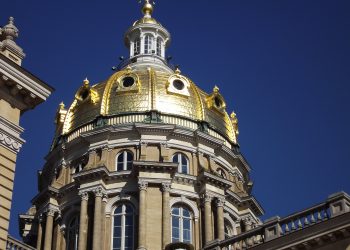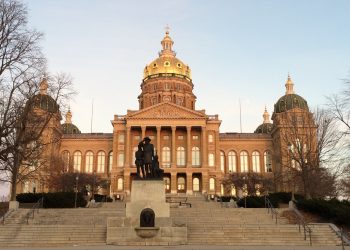DES MOINES, Iowa – Two groups that rarely, if ever, find themselves on the same side of an issue were united in support of a bill that would protect the privacy of members, donors, supporters, and volunteers of non-profit organizations in Iowa.
HSB 28, if passed, would prohibit public agencies from requiring non-profit organizations to personal information about their members, donors, supporters, and volunteers. The bill also prohibits public agencies from releasing, publicizing, or disclosing information without the written permission of an organization’s members, donors, supporters, and volunteers. Public agencies under the bill are prohibited from requiring current or prospective contractors to provide a list of non-profit organizations they support.
Exceptions include the execution of lawful warrants in a criminal investigation. Lawful requests for discovery in a civil suit would also be exempt, provided the requestor can demonstrate a compelling need with “clear and compelling” evidence and obtains a protective order barring disclosure of personal information to any person not directly involved in the litigation. A third exemption would be disclosure required by an agreement between a public agency and a non-profit organization.
The bill provides civil and criminal penalties. It does not impact the Campaign Disclosure Act, which requires campaigns to disclose their donors.
The legislation also states that a court can also order the inspection of a tax-exempt organization’s records, but it must be made under seal from public disclosure.
“We support HSB 28. Believing that those who give donations to non-profits should have the right of privacy for their charitable giving to causes they believe in,” Chuck Hurley with The FAMiLY Leader, a socially conservative organization, said during Thursday’s subcommittee hearing for the bill.
“Anonymous donations to charities are deeply ingrained in our nation’s culture of giving for reasons such as humility, religious obligation, a desire to avoid future solicitations, limiting family strife, etc.,” he added. “Unfortunately, not everyone respects the privacy of charitable givers, in particular, some politicians and activists seeking to target those who disagree with them.”
Hurley brought up the 1958 Supreme Court ruling in NAACP v. Alabama. The Supreme Court ruled that Alabama’s Attorney General could not force the civil rights organization to disclose their donor list to a state that resisted their efforts to assert blacks’ civil rights across the Jim Crow South.
An organization that usually finds itself on opposite sides of The FAMiLY Leader, One Iowa, an LGBTQ advocacy group, supports the bill.
“When you have an issue, like LGBTQ rights, it can be controversial. We promise our donors that we will maintain their privacy, and any attempts to disclose them would, obviously, be us breaking our promise to our donors inadvertently. And that’s a big problem for us,” Keenan Crow, representing One Iowa, said.
Matthew McKinney, representing The Philanthropy Roundtable, concurred.
“Without privacy, you risk contributions and the risk of the ability for people to make charitable contributions to participate in their community to work with family, foundations, and others. And so it could have a chilling effect if people don’t believe that there’s privacy as a relates to that,” he said.
McKinney also pointed out that donor harassment is “very real.”
Victoria Sinclair with Iowans for Tax Relief pointed out the diversity of support for the bill.
“I encourage you to look at the registrations on this bill that most of the groups registered on this bill participates in the most contentious debates in every session on all sides of the issues,” she said.
Sinclair pointed out that this is a First Amendment issue.
“Our members donate to our organizations because they believe in our causes. Whether they do not personally have the time to promote the values organizations espouse, or they fear persecution for holding a view that may be unpopular, individuals donate to our non-profits as a representation of their freedom of speech and association,” she said.
“I’m confident in saying that I’m not the only person speaking in favor of this bill, who has been personally attacked for representing our members’ and our donors’ views. I know I’ve been chased out of this building by individuals shouting at me. I know others who have been spat on or had to be escorted to their vehicle by state troopers to ensure their personal safety. This is an occupational hazard that we’ve all taken on to help advance the causes of our members and our donors. But our members should not have to fear for their lives for holding a view that may be unpopular at any given time,” she added.
State Rep. Christina Bohannan, D-Iowa City, generally supported the bill’s concept and appreciated the diversity of support. She was concerned about the potential unforeseen consequences of the bill.
“There might just be times when through the ordinary work of the judicial branch or through agency work or something like that these things get disclosed,” she said.
Bohannan was also concerned that non-profit disclosures had stricter treatment than other items provided an exemption from public disclosure laws like attorney work product or school records she believed was just as weighty. She was also concerned about the criminal penalties, something not seen elsewhere in similar law. She was unwilling to sign off on the bill at the end of the subcommittee hearing but was willing to consider it along with an amendment offered by the Judicial Branch.
State Rep. Steve Holt, R-Denison, who supports the bill, said the Iowa House attempted to pass a similar bill a couple of years ago. It was tabled because one member, who is no longer in the legislature, “decided to turn it into a political football.”
“I would hate to see that happen again because this is a piece of legislation that should be bipartisan and should, in my opinion, pass with 100 yeses up on the board because we need to value privacy,” he stated.
State Rep. Brian Lohse, R-Bondurant, also supported the bill and said that as a donor, “he lives in this space.”
“My family and I give a lot of money to various organizations,” he said, adding that he would be concerned about his children’s privacy if their names were to be disclosed.
Lohse also pointed out that the bill has been vetted for the last two years. He said they are concerned about unintended consequences and will work to close loopholes with the Judicial Branch amendment. He said the legislature had it long enough.
“When you look at the list of those that are in support, anytime you can get this long list of very diverse opinions, all in agreement, it tells me it’s a good bill,” he said.
HSB 28 will be considered by the full House Judiciary Committee.















